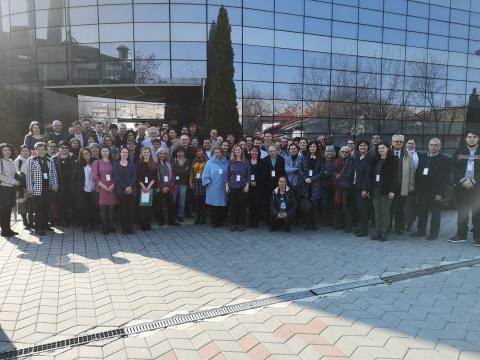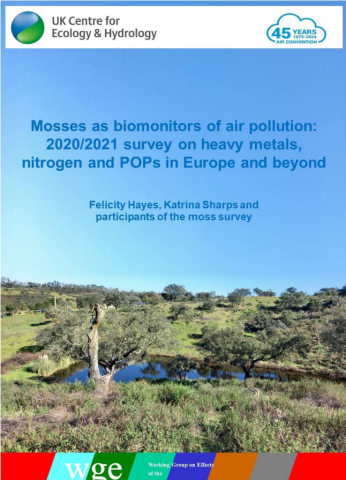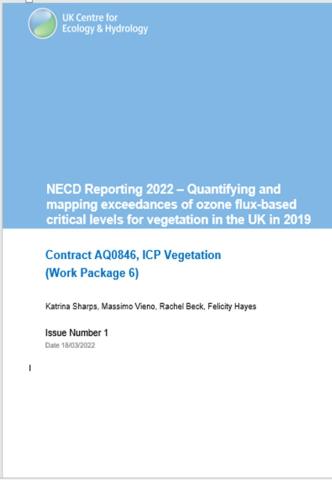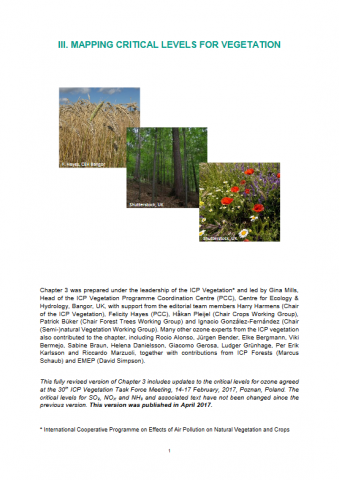
At the beginning of each year, the ICP Vegetation Task Force Meeting is held. These meetings are an opportunity for participants of the ICP Vegetation to come together and share new results and to hear an overview of the activities and achievements made in the past year.
This year, the 32nd Task Force Meeting was held from 18 – 21st February 2019, and was hosted by Valahia University of Targoviste, Romania. The meeting was attended by 79 participants from 31 countries, including representatives from all over Europe, Kazakhstan, Tajikistan, Ukraine, the Russian Federation, Syria, China (including Hong Kong) and Cameroon.
The plenary session of the meeting began with welcome addresses from the Dean of the Faculty of Sciences and Arts at Valahia University of Targoviste (Cristinel Mortici), and a representative of the Dambovita County Environmental Protection Agency in Romania (Dorela Mirica). Harry Harmens (UK), Chair of the ICP Vegetation then gave an overview of ICP Vegetation activities in 2018. Marina Frontasyeva (Russian Federation), Chair of the Moss Survey Coordination Centre gave an update on the outcome of the 2015/16 moss survey, which will be published later this year. Lastly, Klaudia Borowiak (Poland) introduced some students from Poznan University of Life Sciences who are keen to develop biomonitoring programmes for ozone/heavy metals in their home countries (including Cameroon, Kosovo, Syria and Ukraine).
Next, there was a poster session (displaying over 30 posters), with a selection of posters on both ozone and moss survey topics, for example, ozone: investigating the impacts of ozone on ecosystem services of grasslands (F. Hayes, UK), ozone impacts on insects (V. Araminiene, Lithuania) and ozone fluxes in Mediterranean vegetation (V. Calatayud, Spain); and mosses: biomonitoring of toxic metal air pollution using mosses in Albania (F. Qarri, Albania), heavy metal accumulation in Taraxacum officinale L. in urban areas (A. Budka, Poland) and missing values in biomonitoring data (K. Štrbová, Czech Republic).
Following the usual format of the meeting, the next six sessions of the meeting were split into two parallel sessions, covering the ozone and moss survey sub-programmes. Ozone topics presented included ozone flux modelling, impacts on food production, and interactions with nitrogen, while moss topics covered trends in atmospheric deposition of heavy metals, biomonitoring with mosses and lichens, results of recent surveys and preparations for the 2020 moss survey.
For further detail on the content of all oral presentations, the book of abstracts is available on the Task Force Meeting web page:
https://icpvegetation.ceh.ac.uk/32nd-task-force-meeting
At the final plenary session, conclusions and recommendations from the parallel sessions were presented, and a work plan for 2019-21 was provisionally agreed.
Meeting participants were then taken on an afternoon tour of Targoviste, with information from local guides. We visited Chindia Tower and the Royal Court of Targoviste. The guides told us the history of Targoviste, including the story of Vlad Tepes (Dracula).
In the evening we attended the annual Conference dinner, held at the Hotel Nova in Targoviste. Our meeting hosts demonstrated some traditional Romanian dancing and we were treated to a lovely cake to celebrate a successful meeting.
On the final day, there was an excursion to Bran and Peleș Castle in the Carpathian Mountains. Bran Castle (built in 1377), Transylvania, is one of the most visited spots in Romania because it is thought to have been used as the inspiration for the castle in Bram Stoker’s Dracula. We were given a tour of the castle and told all about its history. The interior of the castle now displays art and furniture collected by Queen Marie of Romania (the last queen of Romania). Peleș castle is a Neo-Renaissance castle, built between 1873 and 1914 for King Carol I. We all enjoyed seeing more of the Romanian countryside (including snow-capped mountains), and hearing more of the country’s history on our day trip.
The ICP Vegetation Task Force Meetings are a great opportunity to discuss results and exchange ideas with colleagues. Everyone really enjoyed the meeting this year - special thanks go to our hosts at the Valahia University of Targoviste, particularly Claudia Stihi, Cristiana Radulescu and colleagues.
Next year the meeting is scheduled to be hosted by the University of Latvia in Riga, Latvia, from 27th – 30th January 2020. Further details on this meeting will follow in the autumn of 2019.
https://icpvegetation.ceh.ac.uk/33rd-icp-vegetation-task-force-meeting
Text: Katrina Sharps, Felix Leung
Photos: Katrina Sharps, Felix Leung and Alin Bucurica


